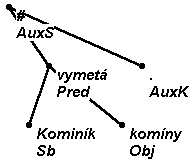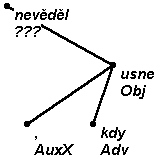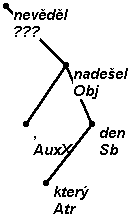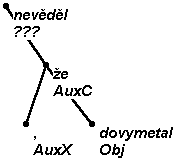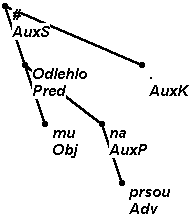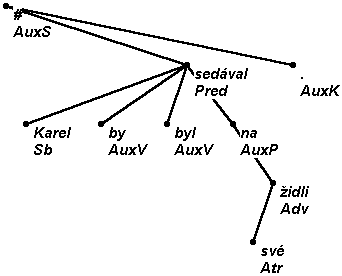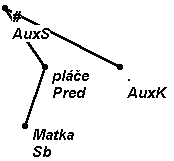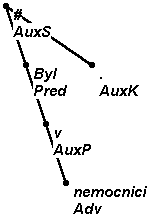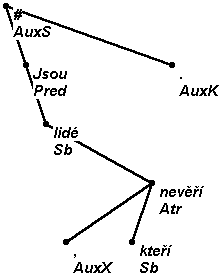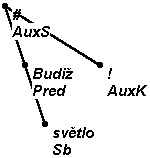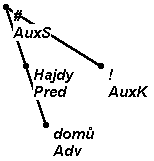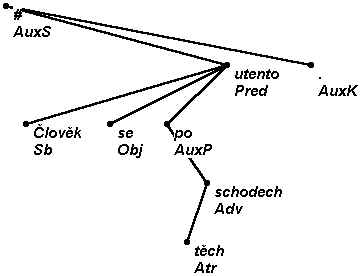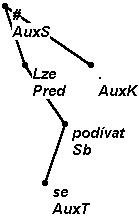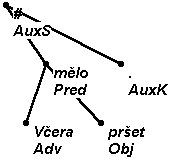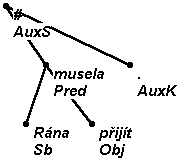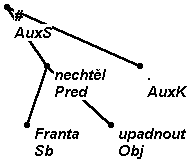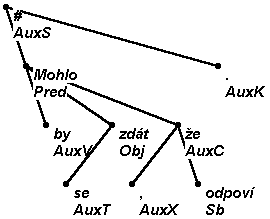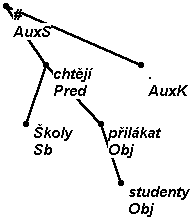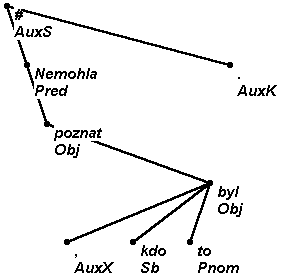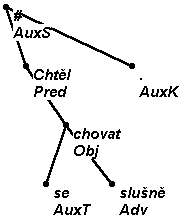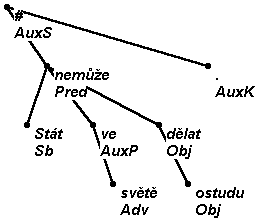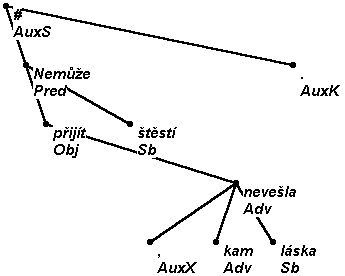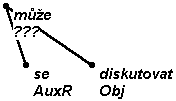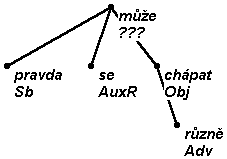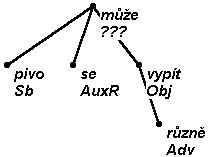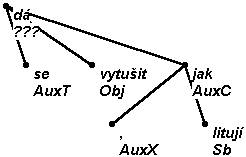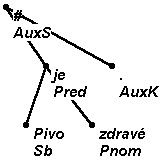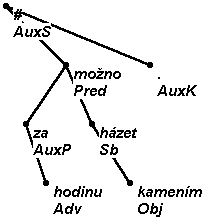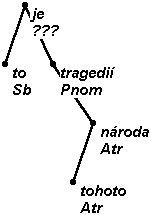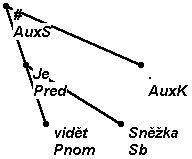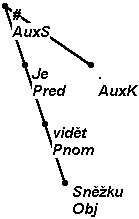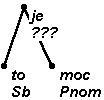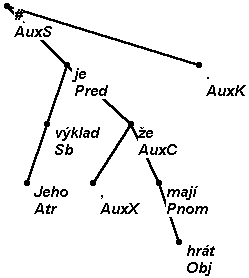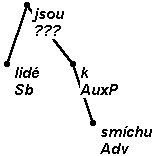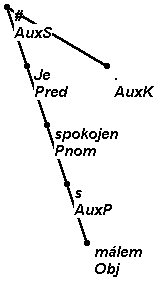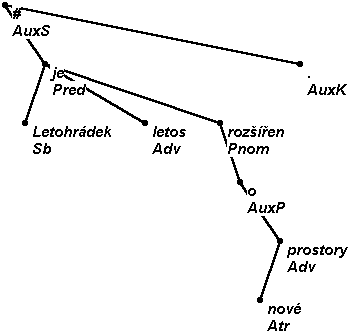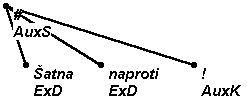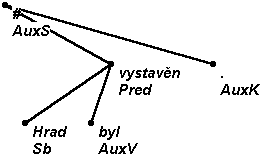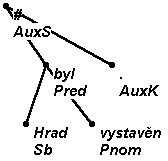In this section our conception of predicate will be described. In its representation mainly three functions are used - Pred, Pnom and AuxV. We shall start by the general part Delimitation of the predicate, which falls into two subdivisions. In the first (Dependency of the predicate) the reader will be instructed how and where the predicate of the main, and that of the dependent clause, are to be suspended, and in the second (Modifying predicate) it is specified what are te possible dependents of the predicate. The subsequent part ( Compound verb forms) is devoted to the function AuxV, used to represent compound verbal forms containing the verb to be.
According to some conceptions there are four kinds of predicates. They are described in the following four divisions. In the division Simple verbal predicate a simple verbal predicate which consists of one word can be found. Compound verbal predicate consists of more words and involves either marked modality or the phases of an event. The part Compound verbal predicate devoted to it consists of three subdivisions. In The structure of the compound verbal predicate its inner structure is dealt with, in Modification of a compound predicate it is its modification, and in Problem of subject and object with compound predicate a minor problem is pointed out concerning its subject or object. The verbal-nominal predicate follows in the subdivision verbal nominal predicate. In the first subdivision, the structure of verbal-nominal predicate we again deal with its structure and we introduce the afun value Pnom, by which the nominal part of this type of a predicate is denoted. This can be expressed in several ways: nominative of a noun (Representation of Pnom by agreeing noun in nominative), genitive of a noun Representation of Pnom by incongruent genitive noun), a compound adjective (Representation of Pnom by a compound form of adjective), a nominal adjective (Representation of Pnom by a nominal form of adjective), infinitive (Representation of Pnom by an infinitive), possessive pronoun (Representation of Pnom by a possesive pronoun), numerical expression (Representation of Pnom by a numerical expression) and a subordinate clause (Representation of Pnom by a subordinate sentence). What fails to be included in this list and what appears to be similar to a possible expression of a nominal part of the predicate, is usually an adverbial (Adv). This fact is mentioned in Possible mistaking of Pnom for Adv.
Further on, in the subdivision Modification of verbal-nominal predicate the modification of the verbal nominal predicate is discussed. The last type of a predicate is the purely nominal predicate, which we, as a matter of fact, do not regard as a predicate, see the part Predicate purely nominal in two-member sentences.
The last part of this section, called Distinguishing state and passive is devoted to distinguishing 'state' from passive. The state exhibits the structure of the verbal-nominal predicate, while the passive is a verbal predicate with the auxiliary be.
The Predicate represents a basic sentence part, i.e., by means of which some property, state, change or activity is attributed to the subject.
The predicate is the head (governing word) of its clause. The predicate of the main clause represents the root of the tree for the sentence, however, technically it is suspended under the initial symbol of the tree (labelled #) and it obtains afun Pred. In subordinate clauses it is not denoted as Pred but by a corresponding function of the subordinate clause (see the examples (2), (3), (4) below).
With subordinate clauses introduced by a reflexive pronoun (který which, kdo who, ...) or pronominal adverb (kde where, kdy when, ...), their predicates get suspended directly under the node governing the whole subordinate clause, while the introducing element depends on a the part of the subordinate clause (exx. (2), (3)). If a subordinate attributive clause is introduced by a conjunction, this conjunction gets suspended under the governing item and the subordinate predicate depends on the conjunction (if need be, cf. Subordinating conjunctions AuxC).
All this holds to the last bit if coordination of more main or subordinate clauses is not the case. As regards coordination, the rules contained in Coordination (sentential, of sentence parts) Coord, <afun> _Co must be applied in addition.
The predicates described below are emphasized.
Note
In the examples (of parts) of analytical tree structures, the nodes are labelled by Czech lemmas and analytical functions (afuns); for each tree we present (the part of) the Czech sentence the structure of which it represents, accompanied by English glosses; in case the glosses would not give sufficient information about the phenomenon under discussion, we add a literal or full English translation of the Czech sentence.
A predicate can have inner (obligatory) and free complements (dependents). They are classified as an object, an adverbial and a complement. Also the so-called sunken parentheses (not separated by commas - Parts of multi-word constructions, some particles, decayed parenthesis AuxY) and sometimes even emphasizing particles ( Emphasizing words AuxZ) can be hung on the predicate. For technical reasons even a whole range of further parts of the sentence can be represented as 'dependent' on the predicate.
If a subject is contained in the clause it depends on the predicate, cf. the following example:
In sentences in which subject is not expressed, Czech being a pro-drop language (e.g. Půjdeme na pivo Shall go out for a beer), we do not complete the subject into the clause, as distinct from what is usual in traditional grammars. This follows from the postulate in Relation to the morphological level, according to which no nodes may be added or taken out of a tree structure. Thus, from the point of view of their outward look, they have the same structure as one-member verbal sentences which have no subject (e.g. Venku prší, lit. Outside is raining). The main element of a one-member verbal sentence is constituted by the predicate and it is assigned afun Pred in the main clause, or the corresponding function of a subordinate clause in the subordinate clause.
The verbal part of a predicate (without modal verbs) can be expressed by a simple or a compound form; the latter form (past or future tense, conditional, passive etc.) contains one or more forms of the auxiliary verb být to be.
The term "compound verb form" must be distinguished from "compound verbal predicate" (the part Compound verbal predicate), with which the whole predicate is composed of a modal or phase verb and a verb form of the finite verb. All auxiliary verbs with a compound (analytical) verb form will be denoted afun AuxV and suspended under the "lexical" part of the verb form. To distinguish passive (with AuxV) from verbal nominal predicate see the part Distinguishing state and passive.
A predicate is usually represented by a finite verb form, either 'lexical' (ex. (1)), or být to be as a 'substitute' (ex. (2)), or as the verb of existence ((3), (4)). In connection with the forms of být, note the parts Compound verb forms (compound verbal forms) and Distinguishing state and passive (distinguishing between a 'state' and the passive).
The predicate can also be represented by a word which becomes a syntactic verb. In the example (5) this is an interjection.
Also the words lze can and nelze cannot are regarded as syntactic verbs (ex. (7)).
Examples (the simple verbal predicate with afun Pred is emphasized):
The compound predicate (composed of the infinitive of a finite verb and of a finite form of a modal or phase verb) is regarded as a connection of Pred and its Obj (infinitive).
The infinitive does not represent a classical object, the concept of afun Obj being a little wider here. Accordingly, this function never passes into afun Sb as can be the case with classical objects, e.g., with passivisation. The infinitive in compound predicates represents Obj under any circumstances.
With modal verbs (except for dá se can be) the particle se can never get afun AuxT; only in some cases it is assigned afun AuxR.
The part denoted Pred is emphasized type.
Essentially, there are two possibilities where to suspend the node that modifies a compound predicate - under the node with afun Pred (finite verb) or under the node with afun Obj (infinitive). The rules which decide are as follows (analogous with the rules for modifying verbal nominal predicate - the part Modification of verbal-nominal predicate below).
The subject always depends on the node with afun Pred (ex. (1), (2)). All valency modifications (i.e., both objects and obligatory adverbials) depend on the verb having such valency, i.e., on the infinitive (ex. (3), (4), (5)). As regards the remaining adverbials, they are suspended according to intuition. If we feel clear dependence (semantic appropriateness) of a free modification on an infinitive, we suspend it in this way. E.g., the adverbial complementation for apples in a clause you may come for apples belongs to the infinitive. On the other hand, the complementation due to illness in a clause he could not come due to illness belongs to the finite verb. In case no clear dependence is felt (usually with local, time and broad respect determinations) we suspend them under the finite verb (ex. (6), (7)). The adverbial determinations dependent on Pred relate through Pred to the whole compound predicate.
Also the infinitive of the copula být to be can depend on the modal finite verb, with Pnom depending on the copula (e.g. může to být pro obchodníky nepřijatelné this may be unacceptable for businessmen; omluva nemusí být závazkem an apology need not be an obligation). There are then three options as for the position of an Adv - modal verb, copula and Pnom; we comply to rules of a whole and of clear dependence; lists of respective valency frames will be used.
Examples:
In what follows, five examples of representation of compound predicate are presented. As has been pointed out above, the infinitive with a modal verb always is handled as its Obj. In the first example the infinitive belongs to a verb not having an object participant, which fact makes the situation simple and clear.
The subsequent two examples differ in their structure. If to an infinitive of a verb having an object participant (as here) such a particular object in the proper form is found (here the accusative pravdu truth), it depends on this infinitive as an Obj. Should, however, such an element fulfilling semantically the function of an (underlying) object, as is the case with the nominative form (pravda) in a reflexive clause, it becomes the subject of the whole clause (Sb).
This also holds in the case in which Nominative and Accusative are expressed by an ambiguous form. Such cases are illustrated by the last two examples.
The verbal-nominal predicate consists of a verbal (copula in finite form) and a nominal (adjective, noun, ...) part. The copula gets afun Pred. The nominal part of the predicate obtains the function Pnom and depends on the copula.
In our approach, only the verb být to be is regarded as copula, although in current grammars also such verbs as become etc. can be handled in this way.
In the part Misinterpretation of complement the problem of commutability (formal similarity) of the nominal part of predicate and complement is discussed.
If copula is absent in the sentence (elided), the procedure remains the same as is usual with ellipses (see Ellipsis ExD, ExD_Co) and all the nodes which would depend on the absent copula (i.e., including the nominal part) obtain afun ExD (see also Predicate purely nominal in two-member sentences).
However, there are exceptions to this rule, concerning words like třeba necessary, nutno urgent, možno possible, záhodno advisable and their negative forms. Such words obtain afun Pred and take thus the function of the whole predicate in the tree. The part Ellipsis of copula with some verbo-nominal predicates is devoted to this phenomenon.
If the nominal part of the predicate is expressed by a noun in nominative (in which, as a rule, also subject is expressed) and if we are in doubt to which noun in the sentence Pnom and to which Sb is to be assigned, we can find help in that we try to use one of them in instrumental. The noun which can be transformed in this way (diamant je drahokamem the diamond is a precious stone) in the sentence obtains the function Pnom.
Pnom printed emphasised.
This manner of expression is rare. Anyway, it is necessary to find out whether some Adv is not the case (e.g., in such sentences as bylo to roku 1921 (it happened in the year 1921), which is a time adverbial, Adverbials (and borderline cases)). Pnom is emphasized:
Pnom is emphasized
Pnom is emphasized
If Pnom is verbal, it is not always easy to distinguish passive from state, a problem dealt with in the part Distinguishing state and passive. Neuter "short" adjective forms (platno of use, jasno clear, zřejmo obvious) obtain afun Pnom, provided a pronominal form of dative can be inserted into the sentence. If this is not possible, afun Adv must be assigned. This difference is illustrated by the following examples:
In the part Modification of verbal-nominal predicate (modification of verbal-nominal predicate) below, it is pointed out that e.g. the word Sněžka (name of a mountain) depends on the copula je is as its subject, while in the accusative form it is an object depending on the infinitive.
Pnom is emphasized
Pnom is emphasized
It holds that a numerical expression obtains the function Pnom only if there is another subject in the sentence. If this is not so, the numerical expression takes over the role of the subject and it can be modified by an attribute (with this problem also the part Genitive in the function of Sb, Obj and in the function of their Atr is concerned.)
Pnom is emphasized
The non-verbal part of the predicate can only be expressed by the eight possibilities mentioned above. A prepositional case, adverbs and interjections are regarded as Adv.
Adv are emphasized
Constructions with jako like are not regarded as Pnom, either; they represent cases of comparison having the function of Adv; however, owing to ellipsis, often afun ExD is used. How to treat these constructions can be found in Phrases of comparison with conjunctions jako (as), než (than).
ExD are emphasized
Modification of verbal-nominal predicate complies with rules analogous to those which modify compound predicate (part Modification of a compound predicate). Subject always depends on the copula (ex. (1)). While in the example mentioned above Sněžka is Subject, in the example je vidět Sněžku (it is possible to see Sněžka) (ex. (2)) the word Sněžka is an object of vidět (to see).
The valency complements (Obj as well as obligatory Adv) depend on the element which has this valency (Pnom, as a rule - ex. (3)). Also free adverbials can depend on Pnom, if they tend towards it strongly owing to their meaning. If, however, we do not feel such tendencies (especially with local, time and wide respect determinations) we suspend them under the copula (ex. (4)).
Note
The decision is very complicated especially with the form pro+Acc for. If a noun in dative could be used at the same time, free Adv may prevail (je pro názornost určen všem uživatelům for the sake of intuitiveness it is destined for all users), with Adv dependent on copula; if pro competes with dative, it is rather Obj, dependent on Pnom.
The purely nominal predicate contains a non-verbal expression only, i.e. with a copula being elided. This can be solved using the function Exd (see Ellipsis ExD, ExD_Co)
As has been pointed out in the part the structure of verbal-nominal predicate, there are exceptions to this rule with such words as třeba necessary. Such words obtain afun Pred, taking thus over the function of the whole predicate in the tree. In the section on ellipses the part Ellipsis of copula with some verbo-nominal predicates is devoted to this phenomenon.
In representing the collocation of být to be and a passive participle, it is necessary to distinguish action, i.e., a real passive form (ex. (1)), from state, i.e. a verbal-nominal predicate (ex. (2)).
If the event exprfessed by periphrastic passive is conceived as a state resulting from the action and the action meaning is subdued in it, it is difficult to distinguish between the two functions. The difference between an action in passive and an adjective with copula can be recognized from the context only. E.g., in the sentence hrad byl tehdy už vystavěn the castle was already built up at that time the meaning is that of a state, while in the sentence hrad byl vystavěn za Karla IV. the castle was built up under Charles IV action passive is the case.
Also the following facts can help. For the most part, the state is expressed by a perfective verb and the passive participle can be replaced by a compound adjective (in the sentence úkol je v čase promyšleně rozložen the task has been ingeniously distributed in time rozložit distribute is a perfective verb, where the form rozložen can be replaced by the form rozložený, which is an adjective). On the other hand, the action passive is usually expressed by an imperfective verb, its transformation into reflexive passive is possible and it can be completed by an instrumental of the originator of the action (in the sentence obilí je koseno sedlákem corn is mowed by a harvester the originator of the action, harvester, is present, the verb is imperfective, and its form can be transformed into kosí se it gets mown).
